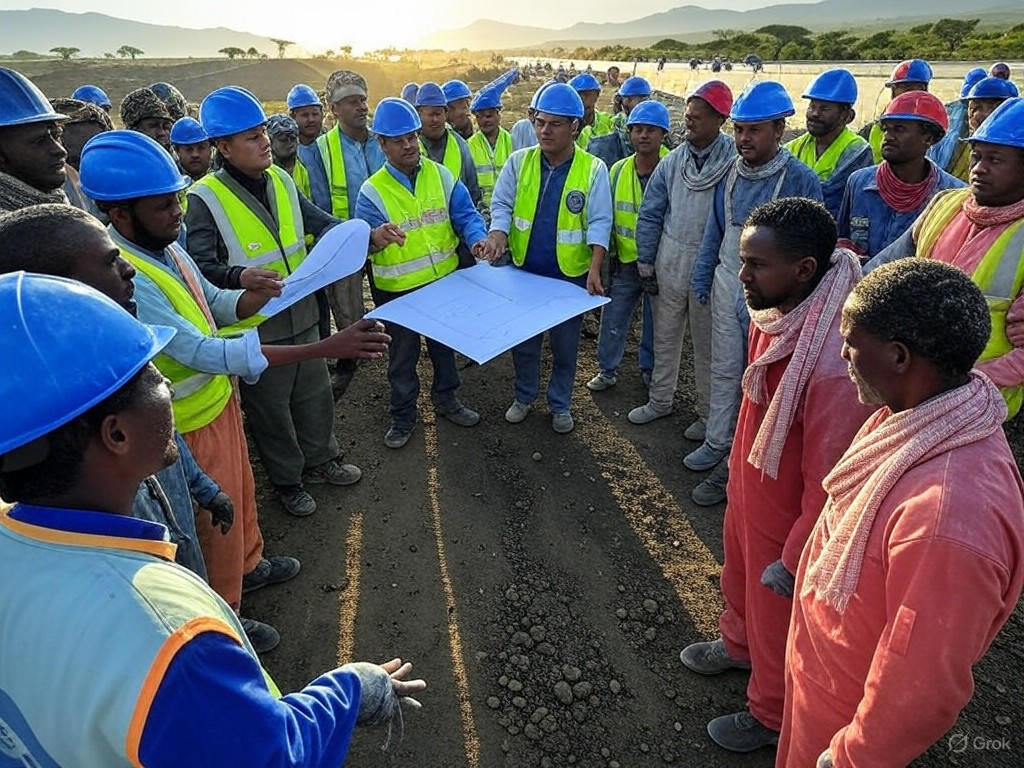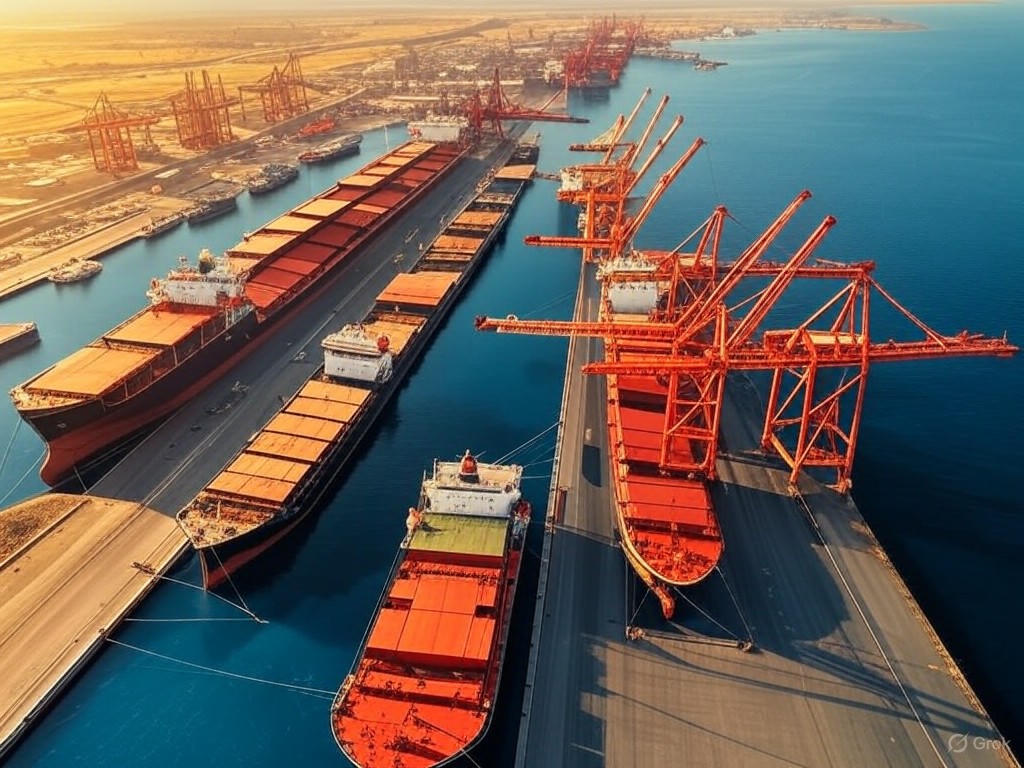China’s Belt and Road: Africa’s Infrastructure Boom or Debt Trap?
Spot News 24 Editorial
Imagine, if you will, a modern-day caravan winding its way across the vast savannas and bustling ports of Africa, not with camels laden by spices and silks, but with blueprints for railroads, dams, and highways. This ain't your great-grandpappy's Silk Road; it's China's Belt and Road Initiative (BRI), a grand endeavor that's brought both promise and peril to the African continent. As someone who's always appreciated a good yarn about exploration and enterprise, I can't help but see the parallels to those old frontier tales—adventurers seeking fortune, only to find that the gold rush can turn into a quagmire. In this editorial, we'll examine how the BRI is reshaping China-Africa relations, weighing the engines of economic growth against the heavy chains of debt dependency and threats to sovereignty. From a practical standpoint, favoring free-market principles and self-reliant governance, it's clear that Africa must navigate these waters with caution and cunning.
The Allure of Infrastructure and Economic Ties
China's Belt and Road Initiative has unfurled across Africa like a vast tapestry, weaving together infrastructure projects that promise to stitch the continent into the global economy. Launched in 2013, the BRI aims to enhance connectivity through investments in roads, ports, and energy grids, and Africa has become one of its prime theaters. Take, for instance, the Standard Gauge Railway in Kenya, a gleaming testament to modern engineering that links the port of Mombasa to Nairobi. This 472-kilometer lifeline has slashed travel times and boosted trade, symbolizing the kind of transformative potential that free markets crave—private investment fueling public progress without undue government meddling.
Yet, it's not all roses and ribbons. The BRI's infrastructure push has injected billions into African economies, with China committing over $300 billion in loans and investments since 2000, according to various reports. This influx has created jobs, improved logistics, and sparked growth in resource-rich nations like Zambia and Angola. Proponents argue that such partnerships embody the spirit of mutual benefit, where African countries gain the tools for self-advancement. As The Wall Street Journal reports, these projects have helped close Africa's infrastructure gap, which the World Bank estimates at $130-170 billion annually. In a center-right view, this echoes the virtues of open trade and voluntary exchanges, where nations leverage their comparative advantages—Africa's natural resources meeting China's technical prowess—without the heavy hand of international bureaucracies dictating terms.

Chinese engineers and local Ethiopian workers break ground on a BRI-funded highway, illustrating the partnership's potential for skill-sharing and economic upliftment.
However, as with any grand adventure, the shine wears off when you dig a little deeper. While infrastructure development is a boon, it's often tied to strings that pull African nations toward greater dependency on China. Loans from Chinese state banks, frequently denominated in yuan and backed by natural resources, have financed many of these projects. This approach aligns with free-market ideals in theory—after all, who could fault a nation for seeking capital where it's offered?—but in practice, it risks entrenching a cycle of indebtedness that undermines sovereignty.
The Weight of Debt and Dependency Concerns
Now, let's turn to the underbelly of this story, where the romance of progress meets the reality of red ink. Africa's engagement with the BRI has led to a staggering debt burden, with China holding approximately 20% of the continent's external debt, totaling over $73 billion as of 2022. Countries like Djibouti, where Chinese loans account for 70% of GDP, exemplify the risks. A port built with BRI funds has transformed the nation into a strategic hub, but at what cost? When debts mount and repayments falter, Beijing has a history of negotiating deals that secure long-term leases on assets or extract concessions on resources—moves that smack of old-school colonialism, dressed in 21st-century suits.
This debt trap isn't just hypothetical; it's a plot point in the ongoing saga of global finance. An analysis from the Brookings Institution highlights how BRI loans often come with opaque terms, higher interest rates than those from traditional lenders like the World Bank, and a lack of transparency that free-market advocates decry. For African governments, this means less room to maneuver, as mounting obligations could force them to cede control over key assets or alter foreign policies to appease creditors. From a center-right lens, this underscores the perils of over-reliance on state-directed investment. Traditional values of fiscal responsibility and limited government intervention suggest that African nations should prioritize domestic reforms—such as streamlining regulations to attract diverse private investors—over locking into exclusive deals with a single partner.
The sovereignty angle adds another layer of complexity. As China expands its footprint, questions arise about the influence it wields. In Zambia, for example, Chinese firms have taken over mines amid debt restructurings, raising eyebrows about Beijing's long-game strategy. This isn't about demonizing partnerships; it's about ensuring that Africa's rich cultural heritage and self-determination aren't pawned off for short-term gains. The African Development Bank's insights emphasize the need for balanced lending practices, advocating for projects that align with local priorities rather than foreign agendas.

The Doraleh Container Terminal in Djibouti, financed by China, stands as a gateway to global trade but also raises flags about strategic dependencies.
Charting a Balanced Path Forward
So, where does this leave us? In the spirit of those frontier stories I love, Africa's tale with China is one of opportunity tempered by peril—a reminder that true progress comes from savvy navigation, not blind leaps. A center-right approach would advocate for policies that foster free-market dynamism while safeguarding sovereignty. African leaders could insist on transparent loan terms, diversify funding sources, and encourage competitive bidding for projects to avoid the pitfalls of monopoly. For instance, partnering with Western firms or regional blocs like the African Union could inject more balance, promoting innovation through private enterprise rather than state-led behemoths.
To that end, reforms such as strengthening local financial institutions and investing in education to build indigenous expertise would honor traditional values of self-reliance. As a report from the Center for Global Development suggests, this isn't about rejecting China outright; it's about creating an ecosystem where investments serve the continent's long-term interests. Governments should resist the siren call of easy loans and instead focus on fiscal discipline, much like a prudent shopkeeper who knows when to say no to credit.
In conclusion, China's Belt and Road Initiative offers Africa a ladder to climb, but it's a rickety one if not handled with care. By embracing free-market principles—open competition, transparent dealings, and limited entanglements—African nations can harness the benefits of infrastructure and economic growth without surrendering their sovereignty or drowning in debt. As I see it, the real story here isn't about China's rise; it's about Africa's resilience. Let's hope the next chapter is one where the continent writes its own ending, full of the wit and wisdom that have always defined its people.

